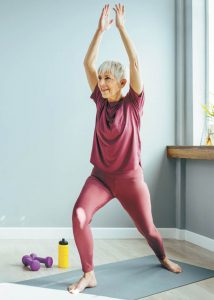By Colin E. Champ, MD, CSCS – Radiation Oncologist


Being handed a cancer diagnosis can be devastating. It is the word no one wants to hear from their doctor, but it seems almost inevitable at times. In fact, cancer is the second leading cause of death in the United States. If you are not the one who is in the fight at the moment, it is highly likely that you know someone who is.
The good news is that the survival rate for many types of cancer is quite high. According to the cancer.gov website, as of January 2019, there were an estimated 16.9 million cancer survivors in the United States. The number of cancer survivors is projected to increase to 22.2 million by 2030. (1)
So, what can we do to help us be one of the survivors? One thing that has shown to be effective is getting plenty of exercise while undergoing cancer treatment. Virtually every doctor in the world will tell you that getting a good amount of exercise is vital for survival, but how much exercise and what types of exercise should you be getting?
Being physically active can be difficult while undergoing aggressive cancer treatments like chemotherapy and radiation. However, research clearly shows that most people who are more active during cancer treatment have fewer side effects, a faster recovery time, and, in some cases, a decreased risk of the cancer returning. (2)
If you are undergoing cancer treatments, exercise recommendations, even minimal ones, can sound overwhelming. It is important to understand that exercise is another form of treatment. It isn’t just something one does to maintain a good physique. We simply must change this mindset. Exercise is medicine.
Benefits of physical activity while undergoing cancer treatment
Some of the benefits of exercising during and after cancer treatment include:
- Cancer-related fatigue is one of the worst and most common symptoms of cancer. And what is the best medicine for fatigue? Exercise! Build in short periods of activity instead of lying down. Exercise will improve your mood by reducing anxiety and depression. Additionally, exercise will improve bone health and make everyday activities easier. And as if all of these benefits aren’t enough, exercise helps improve your ability to engage in daily activities.
- Resistance training is becoming part of cancer treatment because of the various benefits it provides. Resistance training programs that target “hypertrophy, bone density, strength, functional mobility and body composition” have been shown in some cases to improve treatment outcomes and quality of life for patients and survivors. These programs should be individualized and monitored by a qualified professional and should “adequately stress the musculoskeletal system”. (2)
- Muscles fight cancer and can lower the risk of dying from cancer by as much as 40%, according to a study conducted at the Cooper Institute in Dallas, Texas. That same study showed that “higher levels of muscular strength are associated with lower cancer mortality risk in men.” (3) The study indicated that being strong can lower one’s risk of getting cancer in general and boost the chance of survival.
Colin Champ, M.D., C.S.C.S, has dual board certifications in Radiation Oncology and Integrative and Holistic Medicine. He is an Associate Professor at Drexel University College of Medicine. If you would like to read more of his articles about how exercise affects cancer survival, visit his website at colinchamp.com.
Inspire Exercise Medicine is focused exclusively on supporting cancer patients on the road to regaining their health with oncologist defined, evidence-based treatment plans for nutrition and exercise in support of their overall health and wellness.
A significant part of the Inspire Exercise Medicine space is dedicated to physical, monitored exercises on machines and with exercise equipment, specifically selected for treatment purposes.
239.429.0800
InspireExerciseMedicine.com
3555 Kraft Road, Suite 130
Naples, FL 34105
- Cancer statistics, National Cancer Institute. Available at: https://www.cancer.gov/about-cancer/understanding/statistics.
- Champ, C.E., Carpenter, D.J., Diaz, A.K. et al. Resistance Training for Patients with Cancer: A Conceptual Framework for Maximizing Strength, Power, Functional Mobility, and Body Composition to Optimize Health and Outcomes. Sports Med 53, 75–89 (2023). https://doi.org/10.1007/s40279-022-01759-z
- Ruiz JR;Sui X;Lobelo F;Lee DC;Morrow JR;Jackson AW;Hébert JR;Matthews CE;Sjöström M;Blair SN; (no date) Muscular strength and adiposity as predictors of adulthood cancer mortality in men, Cancer epidemiology, biomarkers & prevention: a publication of the American Association for Cancer Research, cosponsored by the American Society of Preventive Oncology. U.S. National Library of Medicine. Available at: https://pubmed.ncbi.nlm.nih.gov/19366909/ (Accessed: April 23, 2023).
References:
1. Cancer statistics, National Cancer Institute. Available at:
https://www.cancer.gov/about-cancer/understanding/statistics.
2. Moving through cancer: – exerciseismedicine.org. Available at:
https://www.exerciseismedicine.org/wp-content/uploads/2021/04/
Consolidated-Infographic-for-the-ACSM-Roundtable-on-Cancer-
and-Exercise.pdf .
3. Champ, C.E., Carpenter, D.J., Diaz, A.K. et al. Resistance Training for
Patients with Cancer: A Conceptual Framework for Maximizing Strength,
Power, Functional Mobility, and Body Composition to Optimize Health and
Outcomes. Sports Med 53, 75–89 (2023).
https://doi.org/10.1007/s40279-022-01759-z
4. Ruiz JR;Sui X;Lobelo F;Lee DC;Morrow JR;Jackson AW;Hébert JR;Matthews
CE;Sjöström M;Blair SN; (no date) Muscular strength and adiposity as
predictors of adulthood cancer mortality in men, Cancer epidemiology,
biomarkers & prevention: a publication of the American Association for
Cancer Research, cosponsored by the American Society of Preventive
Oncology. U.S. National Library of Medicine. Available at:
https://pubmed.ncbi.nlm.nih.gov/19366909/ (Accessed: April 23, 2023).
 Southwest Florida's Health and Wellness Magazine Health and Wellness Articles
Southwest Florida's Health and Wellness Magazine Health and Wellness Articles

